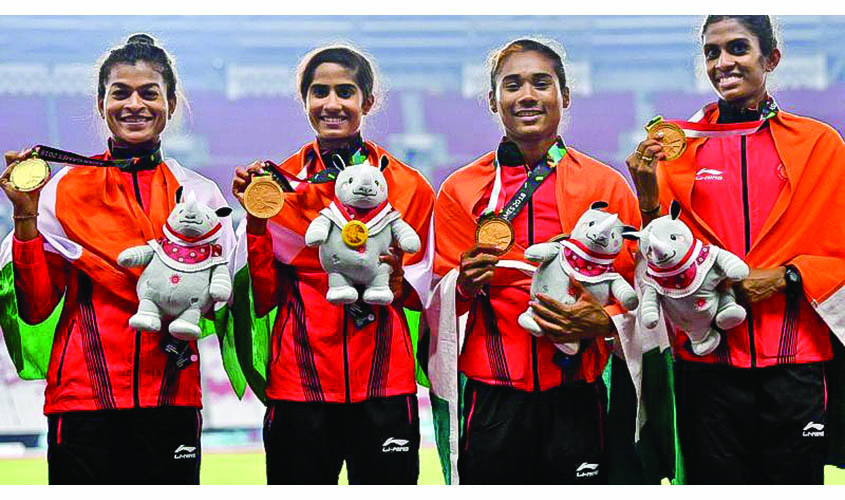Even after putting up their best ever performance, India slugged at the eighth position in the medals tally at recently concluded Asian Games in Jakarta, Indonesia. Ideally, India should henceforth acquire the fourth position, after China, Japan and Korea, in the coming Asiad events. But the moot question is how the Indian contingent would be able to pull it off.
Although there have been a lot of changes in Indian sports in the last few years, we need to follow the Chinese model where the basic infrastructure is made available to sportspersons from the very beginning of their career. Today, there are more than 15,000 sports schools in China where talent is identified at the childhood level itself. Studies and sports go hand in hand as a result of which children come out as a top level players in future.
But in India, nearly 60% of the schools have no proper playground. Even the sports classes are used to complete the home work or to meet other needs. More than 90% of the schools in the country are not provided with basic sports equipment. Players get the benefits of government schemes like Target Olympic Podium (TOP) only after emerging at the national scene. The picture is even more frightening at the district, block or village level.
Secondly, though athletics remained the shining area for India at Jakarta, it is necessary to form a clear policy on more than 15 other games in which India has returned home empty-handed. This time, India not even had a bronze in swimming, diving, weightlifting, gymnastics, handball, volleyball, basketball, judo, karate, taekwondo, canoeing and kayaking, fencing, golf, pencak silat and cycling.
Swimmers can draw solace from the fact that five of them reached the final this time and Virdhawal Khade missed a medal by a whisker (0.01 second). In the rest of the games, the India contingent was seen battling even to survive at the lowest rank.
When China hosted the Games at Beijing in 2008, they announced its ambitious “Winning Pride Scheme” seven years ago. Under this scheme, they spent $ 3 billion in preparation for 2004 Athens Olympic Games. No wonder that China ranked second after the US with 32 gold medals. In these games, China gave opportunity to many budding players. In the next Olympics, China secured 48 golds with first position.
In the recent Asian Games, Uzbekistan was ranked above India due to inclusion of its traditional games Kurash and winning six gold out of seven in it. Indonesia won 12 gold out of 14 in Pencak Silat, China had 10 in Wushu, South Korea five in Taekwondo, Japan 13 out of 27 in judo and karate. Comparatively, there were only two gold in Kabaddi and India couldn’t even get a single gold.
Moreover, providing economic security to the medal winners is a great encouragement and Haryana is the best example. This needs to be tried in other states too. For many years, recruitments in jobs via sports quota were stagnant in many states. Though they have revived the scheme, it has more or less remained a mere formality. There is also a need for nation-wide campaign for sports, which will be useful in inculcating a sports culture in the country.
China has started a campaign to inspire 30 million people for the next Winter Olympics so that the whole country gets involved in such a big event to give every possible support to its players. For them, the Asian Games or the Olympics are not less than any world war.
Lack of proper medical facilities has also hampered growth of sports in India. Even sports stars like Mirabai Chanu have failed to recover from their injuries owing to this reason. Appointment of foreign coaches is another reason in which squash controversy occurred in Jakarta where Deepika Pallikal and Joshna Chinappa preferred to take coaching from their team mate Saurabh Ghoshal rather than their coach.
Lack of ideal video analyst is another weak area in our country. Today, video analysts are dependent on YouTube only. Many of the sports federations have not even appointed any video analyst. It is necessary to provide the maximum footage of foreign players to help the coach.
Last but not the least, the public sector units Olympic Gold Quest and the Go-Sports Foundation should be encouraged to play greater role in improving the sports scenario of the country. At the same time, there is a need to expand the ambit of TOP scheme.

